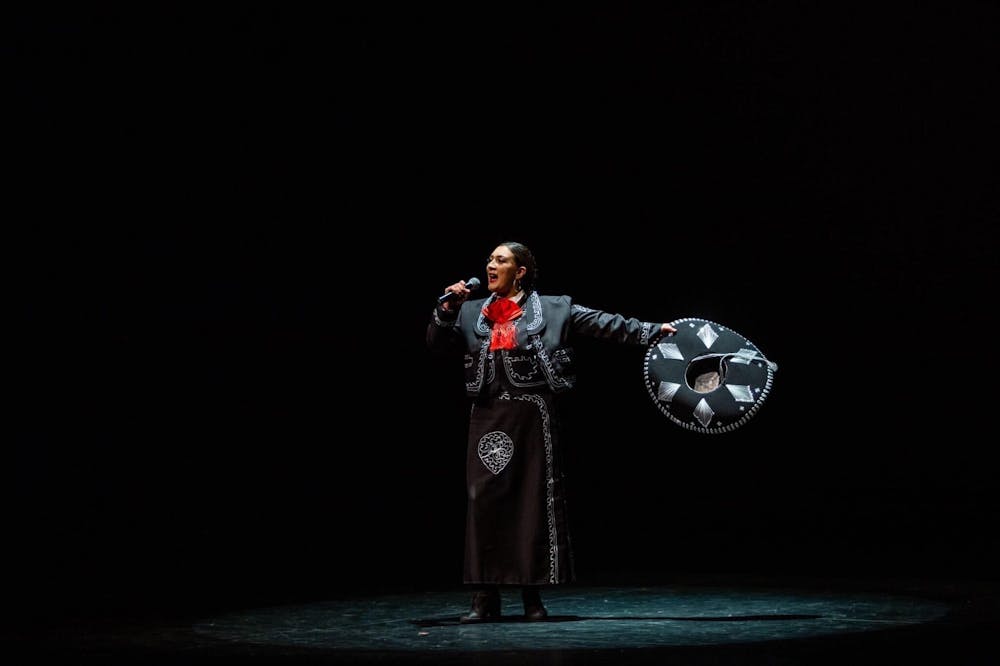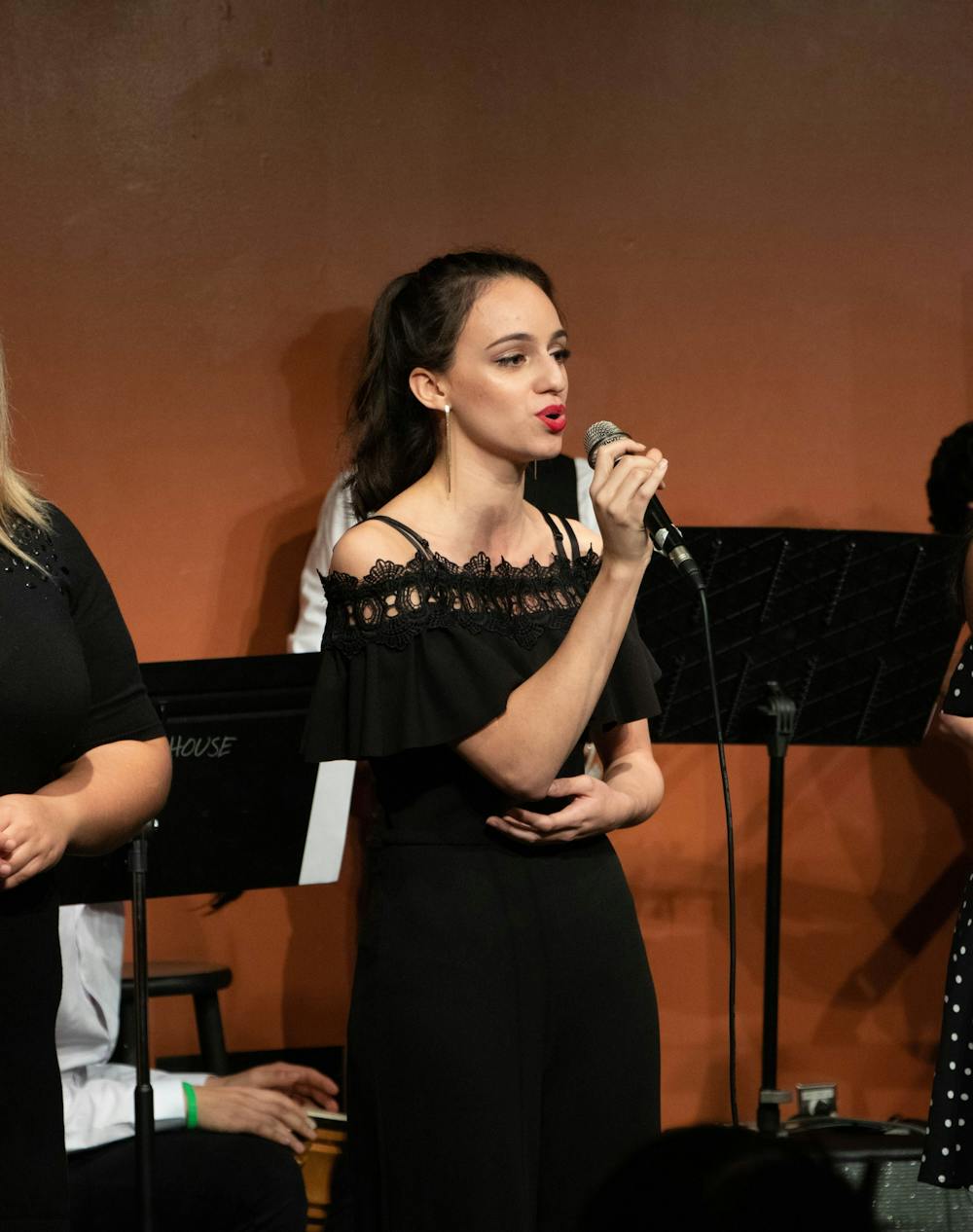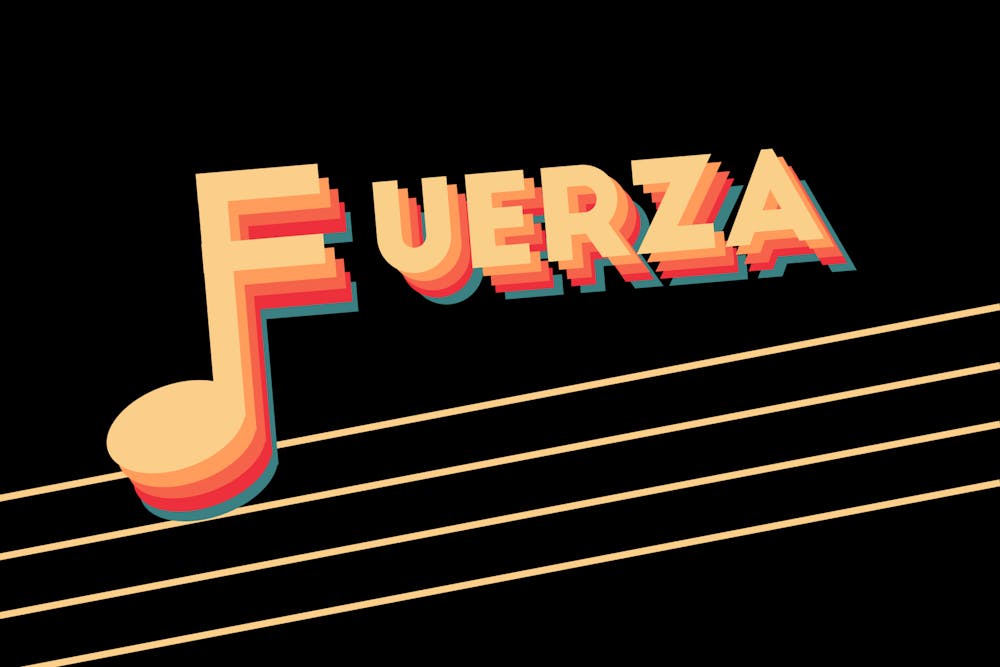“Never again. Never again.”
“I mean, I enjoyed it. I didn’t fall out like you.”
“I almost died going over the bridge!”
“At least we didn’t break the stuff.”
Laughter fills the call as Nikole Bonillas Félix (C’22) and Arianna Acevedo-Ithier (C’22) travel back to their last days together in person. Each is perched in a cart overflowing with music equipment as their friends push them along a dark and empty Locust Walk. Holding on for dear life—and to keep the many instruments and microphones they’ve borrowed safe—they make their way to Ari’s room. Somehow, with the help of some bystanders, the crew finally fits into the Rodin elevators at an ungodly hour. These midnight excursions from La Casa Latina to the high–rises are standard protocol whenever their group has a performance coming up.
Nikole and Ari began building Fuerza from scratch in fall 2019, with the goal of providing a space to share and appreciate Latinx culture through music. It’s a space that hasn’t existed before at Penn, and one that the friends agree the community needs.
In its first year, Fuerza headlined a show at Platt, performed at several events around campus and at neighboring schools Swarthmore and Temple, and hosted a benefit concert with Asociación Boricua to support those impacted by the earthquakes in Puerto Rico. The pair call it chaotic, and entirely worth it. “This is our portal to our creative expression, our feelings, our everything,” remarks Nikole. “I can’t think of any other way to share our stories than through a song.”
The seeds were planted early on, before Nikole and Ari even entered their freshman year. They remember meeting quite well (Nikole’s sure she was wearing pink); talking to a group of fellow QuestBridge students during Quaker Days, Ari had just learned that “Wawa” in Philly doesn’t mean “bus” like it does to Puerto Ricans. Nikole, who hails from Mexico, was in mutual astonishment. From there, the two learned they had a lot more in common—they were both lifelong musicians, for starters.
Fast–forward to the fall, when Ari stumbled upon Nikole performing in an event at La Casa. Impressed by her talent, Ari sought out to reconnect.
“She fucked up a little, which made me like her more,” Ari adds. “She was almost perfect.”
Nikole had been playing guitar and singing since she was two, part of a family of musicians covering the spectrum from mariachi to heavy metal. She remembers wanting to be Hannah Montana, and spending endless hours making music after school. Much to her chagrin, her mother had a different view of music for her and enrolled her in a local church choir after they immigrated to Laredo, Texas. “I only did it because she said that’s how Christina Aguilera made it big,” Nikole jokes.

Nikole refers to her playlists as her love language and songs as her means of getting to know a culture. “The more and more that I got to do it for fun, the more and more I realized it was such an essential part of me,” she explains. “If I can’t speak about what I’m feeling, I use music instead.”
Ari traces her first singing memory to age three, recording the ABCs in a makeshift home studio that her father built. Surrounded by Puerto Rican and Caribbean music, she recalls that she was doing the the salsa as a toddler. She began learning piano at age eight, and guitar not long after. Before coming to Penn, she sang for a few different choirs and bands, one of which performed at Summerfest in her hometown of Milwaukee. Now a classically trained vocalist and lyricist, Ari isn’t afraid to “pull it out on the middle of Locust”—which Nikole confirms is surely a delight.

“To read my music journal is just as big of an invasion of privacy as reading a normal diary,” says Ari. “That’s how I’ve always channeled my trauma, my emotions, and my experiences. I share a piece of my soul when I sing.”
Both coming from strong Latinx communities, Nikole and Ari felt something was missing when they got to Penn. Wondering where they’d fit in, they joined a number of clubs and support groups—many of them together—including La Casa and La Vida Magazine. And while these experiences were rewarding, they wanted to be heard even more. The first hint came when neither made it into other groups they auditioned for. “It was a sign we weren’t supposed to sing in English here,” Ari reflects.
To both friends, the meaning of their club boils down to creating tighter bonds with the Latinx community and increasing representation in the University. But Fuerza is not an exclusive group—all are welcome to listen or get involved. Some of the members don’t even identify as Latinx.
“A lot of people in the audience don’t understand the words we’re singing,” acknowledges Nikole. “But to feel the emotion behind it, I think, is enough. It transcends language.”
Nikole and Ari look forward to seeing Fuerza thrive in its second year. “Hopefully sooner than later, we’ll be able to bring that piece of joy back to our community on campus,” Nikole says.
“It’s all about opening that window and keeping it open for the future.”

